
Bengali cuisine is the culinary style of Bengal, that comprises Bangladesh and the Indian states of West Bengal and Tripura. The cuisine has been shaped by the region's diverse history and climate. It is known for its varied use of flavours including mustard oil, as well as the spread of its confectioneries and desserts. There is a strong emphasis on rice as a staple, with fish traditionally the most common protein. Freshwater fish are preferred to seafish, although barramundi, known as bhetki, is also common. Meat is also a common protein among Bengalis with beef and goat meat being the most popular. In more recent times, lentils have begun to form a significant part of the diet. Many Bengali food traditions draw from social activities, such as adda, Eid feast or the Mezban.
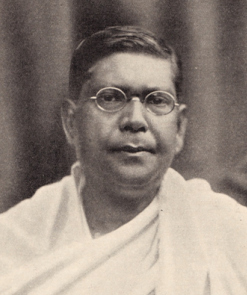
Chittaranjan Das, popularly called Deshbandhu, was an Indian freedom fighter, political activist and lawyer during the Indian Independence Movement and the Political Guru of Indian freedom fighter Netaji Subhas Chandra Bose. He is the founder-leader of the Swaraj Party in undivided Bengal during the period of British Colonial rule in India. His name is abbreviated as C. R. Das. He was closely associated with a number of literary societies and wrote poems, apart from numerous articles and essays.
Bengali Brahmos are those who adhere to Brahmoism, the philosophy of Brahmo Samaj which was founded by Raja Rammohan Roy. A recent publication describes the disproportionate influence of Brahmos on India's development post-19th Century as unparalleled in recent times.

Rasgulla is a syrupy dessert popular in the eastern part of South Asia. It is made from ball-shaped dumplings of chhena dough, cooked in light sugar syrup. This is done until the syrup permeates the dumplings.

The Bengal Renaissance, also known as the Bengali Renaissance, was a cultural, social, intellectual, and artistic movement that took place in the Bengal region of the British Raj, from the late 18th century to the early 20th century. Historians have traced the beginnings of the movement to the victory of the British East India Company at the 1757 Battle of Plassey, as well as the works of reformer Raja Rammohan Roy, considered the "Father of the Bengal Renaissance," born in 1772. Nitish Sengupta stated that the movement "can be said to have … ended with Rabindranath Tagore," Asia's first Nobel laureate.
Das is a common last name in South Asia, among adherents of Hinduism and Sikhism, as well as those who converted to Islam or Christianity. It is a derived from the Sanskrit word Dasa meaning servant, devotee, or votary. "Das" may be inferred to be one who has surrendered to God. The surname is often used by those in the Vaishnav community.
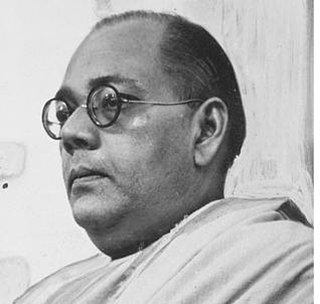
Sarat Chandra Bose was an Indian barrister and independence activist.
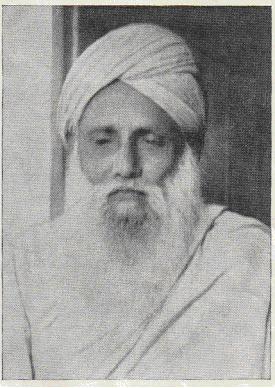
Bhavabhushan Mitra, or Bhaba Bhusan Mitter, alias Swami Satyananda Puri was a Bengali Indian freedom fighter and an influential social worker.

Ras malai, also known as rosomalai, or roshmalai, is a dessert from the Indian subcontinent. The dessert is called roshmalai/rosmalai in Bengali, ras malai in Hindi, and rasa malei in Odia. It is popular in India, Bangladesh and Pakistan.

Pathuriaghata is a neighbourhood of North Kolkata in Kolkata district, in the Indian state of West Bengal. It is one of the oldest residential areas in what was Sutanuti. Once the abode of the Bengali rich, the neighbourhood and its surrounding areas are now dominated by Marwaris. Even in the 21st century the area is replete with colonnaded mansions.
Bhagwandas Bagla was the first Marwari Shekhawati millionaire (crorepati). He was a very wealthy timber merchant and owned several Saw Mills. Bhagwandasji was originally from Churu, Rajasthan but proceeded his business to Burma and eventually settled in Rangoon. He proceeded his business to Burma during King Thibaw’s time. During the Anglo-Burmese War he became a big Military Supplier and Contractor, he built several roads, bridges etc. in Burma. He owned thousands of acres of Paddy lands facing Rangoon Harbour. He was a Banker, Landlord and Merchant, owned considerable properties in Rangoon, Mandalay, Moulmein and several other cities in Burma. He was awarded with the title of "Rai Bahadur" by the British Raj in February 1890.

Debendra Mohan Bose was an Indian physicist who made contributions in the field of cosmic rays, artificial radioactivity and neutron physics. He was the longest serving Director (1938–1967) of Bose Institute. Bose was the nephew of the famous physicist Jagadish Chandra Bose, who laid the foundations of modern science in India.
Kali Babur Bari is located in Janai, Hoogly, West Bengal.
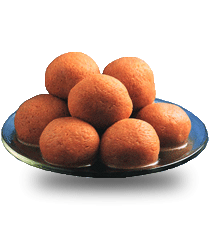
Bikalananda Kar is an Indian confectioner from Salepur, Odisha and founder of "Kar & Brother" which is known for popularising the rasagola, an Indian desert. Kar laid the foundation of his shop in last of 1922. The rasagolas prepared by the descendants are considered the best rasagolas in Odisha. These rasagolas are famously named "Bikali Kar Rasagola" is sold all over Odisha and abroad.

Nobin Chandra Das (1845–1925) was a Bengali confectioner, entrepreneur, businessman and cultural icon in the second half of 19th and early 20th century. Widely known as the creator of the iconic Bengali sweetmeat "Rosogolla", a popular limerick of 19th-century Bengal labeled him as the "Columbus of Rossogolla" or simply the "Father of Rosogolla".

Krishna Chandra Das (1869–1934), commonly referred to as K.C. Das, was a Bengali confectioner, entrepreneur, businessman and Bengali cultural icon of the early 20th century. Born in 1869 in Bag bazar, Kolkata, Krishna Chandra was the only son and successor of the Bengali confectioner and sweetmeat inventor Nobin Chandra Das. Krishna Chandra was a versatile enthusiast with a spirit of scientific exploration. He developed an electric loom, a soda fountain machine, did extensive research on homeopathy, and researched eastern and western classical music. Krishna Chandra Das became an iconic figure in the 1930s Kolkata with his original creation the "Rosso Malai" and the vacuum canned "Rosso Golla", which were popularized and promoted throughout India by his family organization K.C. Das Private Limited, founded by Krishna Chandra's son and successor Sarada Charan Das.

Sarada Charan Das was an Indian Bengali polymath, scientist, confectioner, entrepreneur and businessman. He was the youngest son and successor of Krishna Chandra Das and the grandson of the legendary Bengali confectioner Nobin Chandra Das. Born on 15 May 1906, he established the first confectionery company in India, named K.C. Das Private Limited, in 1946. Sarada Charan also created artwork and competed for India at the 1956 Summer Olympics in weightlifting. He is considered as the founding father of K.C. Das Private Limited and a major innovator and pioneer of the Bengali sweetmeat industry due to his contributions towards revamping, modernizing and scientifically standardizing the confectionery industry.

Palta is a locality in North Barrackpur Municipality of North 24 Parganas district in the Indian state of West Bengal. It is a part of the area covered by Kolkata Metropolitan Development Authority (KMDA).
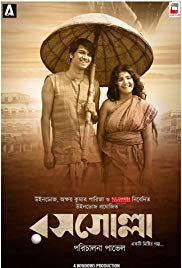
Rosogolla is a 2018 Indian Bengali historical drama film directed and written by Pavel. Rosogolla marks the big screen debut of Ujaan Ganguly and Abantika Biswas. It is a fictionalized biopic of Nobin Chandra Das, a sweet maker from Kolkata, the inventor of Rosogolla.

Abar Khabo is a sweet originating in West Bengal that consists of two concentric spheres containing pistachios, cashews, raisins and kheer.















